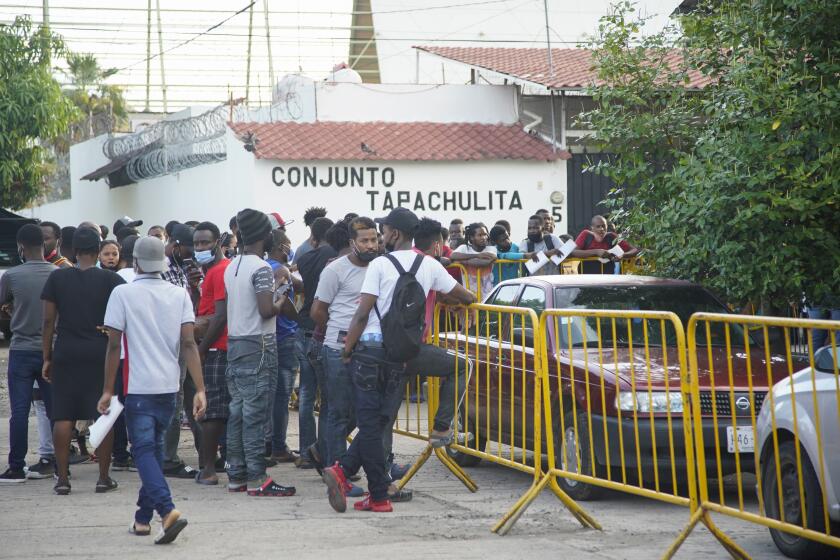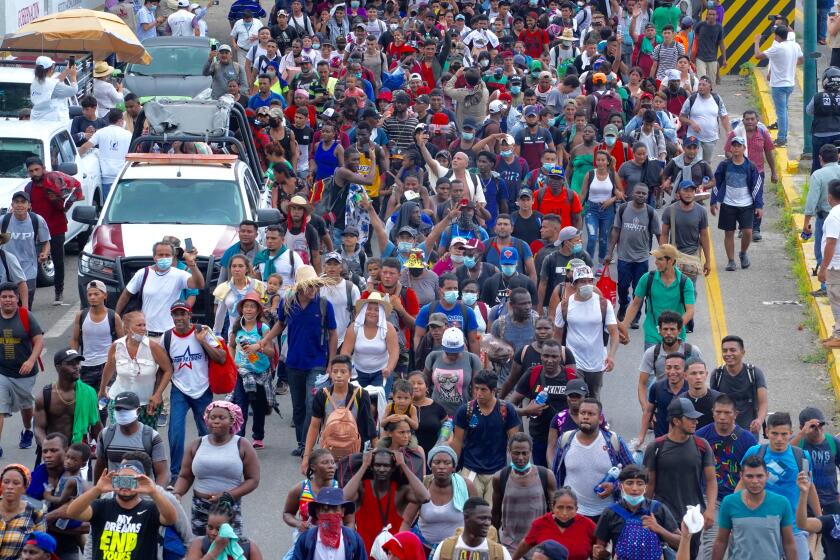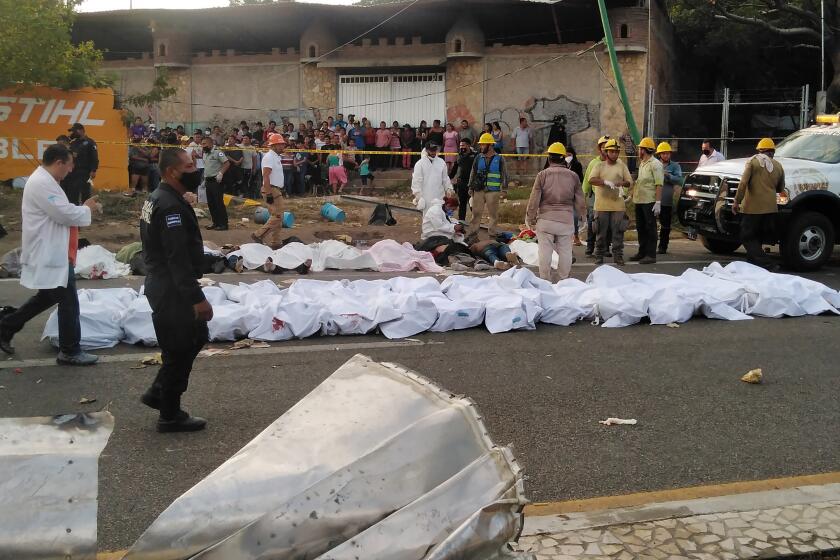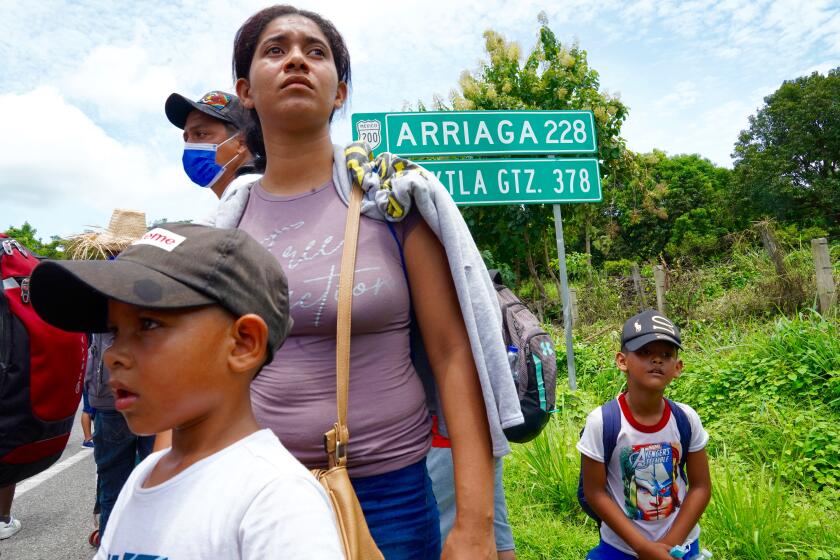In southern Mexico, a crush of stranded migrants clashes almost daily with authorities
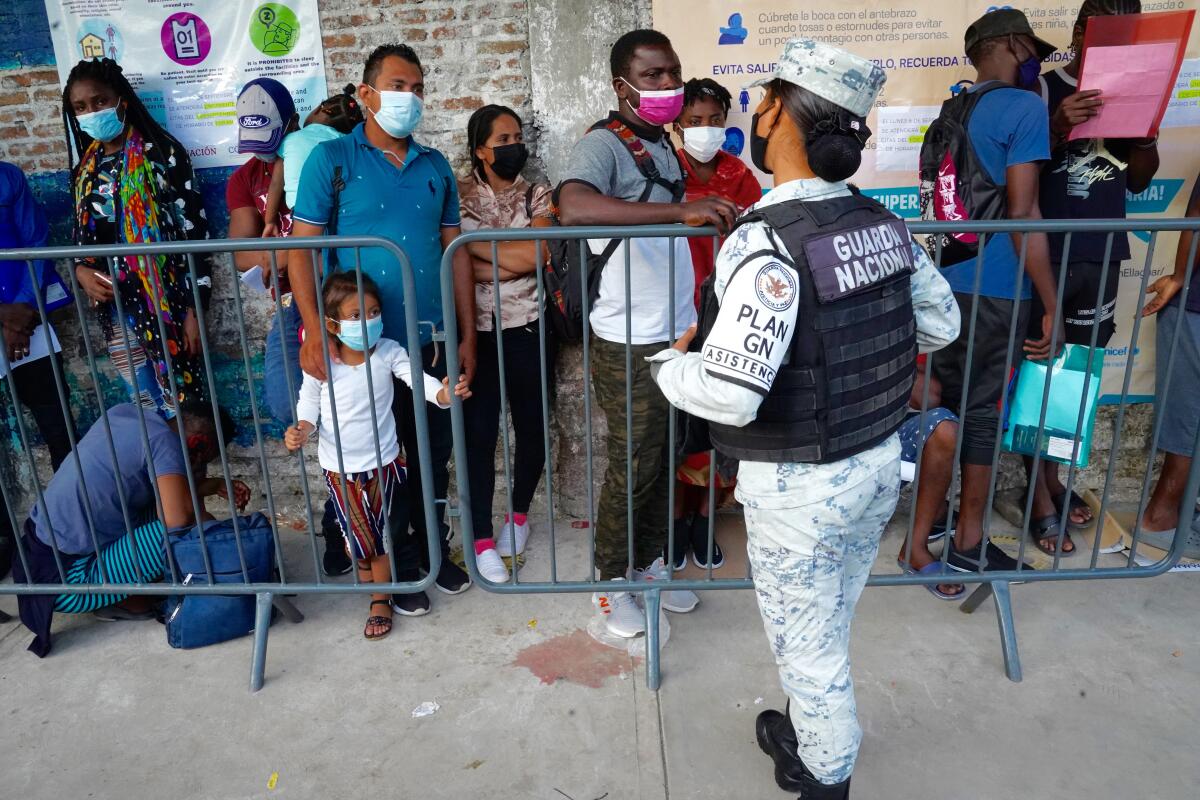
- Share via
TAPACHULA, Mexico — After months of simmering tensions between officials and tens of thousands of migrants stranded in this sweltering southern Mexican city, violence erupted.
As a large group of migrants sought to edge their way into an immigration office in hopes of procuring a humanitarian visa that would allow them to continue traveling north to the border with the United States, a frustrated immigration agent snatched folders from the hands of several migrants and threw them on the ground, scattering documents in the dust.
The migrants, in turn, threw rocks at the agents. Soon the National Guard was called. Twenty migrants were injured in the melee that followed.
“It was a mess, a complete mess,” said Belando Saint Louis, a Haitian migrant who has been waiting in Tapachula for four months, along with his wife and two children.
Nearly every day since that first scuffle on Feb. 15, the same pattern has repeated: Groups of migrants camp out overnight in front of the office, but frustration with the snail’s pace of bureaucracy means many leave at the end of the day empty-handed. Frustration rises to a boil, and people begin throwing things.
In Tapachula, many migrants request asylum because they feel that is their only choice. Some still hope to reach the U.S.
During several of the confrontations over the last few weeks, migrants have set piles of dry brush on fire in the middle of streets and highways, creating smoking blockades. And on Friday, after migrants again stormed the office, Mexico’s National Immigration Institute announced that its Tapachula branch would be closed until further notice. In a statement, the institute said the migrants had “caused physical injuries to personnel and damage to equipment and facilities.”
Southern Mexico has for decades been a way station for Central American migrants seeking to make their way to the United States. But in the last decade or so, Mexico has emerged as a signature transit country for migrants from across the globe, including the Caribbean, South America, Asia and Africa. About 40% of the migrants stuck in Tapachula hail from Haiti, where a series of natural disasters and political unrest over the last year have caused a mass exodus.
The violent protests are a sign of the mounting desperation of the stranded migrants, many of whom believe their journeys north are being hampered by unfair laws, grinding bureaucracy and in some cases racism, and who say they feel like prisoners.
“There aren’t any jobs in Tapachula, so how am I supposed to live when the money is gone?” said Saint Louis, who has not yet been able to secure an appointment at the immigration office. The family’s journey began two years ago in Leogane, a coastal city in western Haiti, where Saint Louis worked in construction. Now, money sent to the family by relatives in the U.S. is running out.
There are so many Haitians in Tapachula that the Mexican city can seem like a slice of the Caribbean. Under U.S. pressure, Mexican authorities won’t let them leave.
Saint Louis barely spends any time in the room he rents for his family, instead setting up shop in the park. He sells phone cards, trades currencies and is always looking for new ways to make money. But it’s all black market.
“If I had authorization to work in Mexico, it would be easy,” he said.
In an attempt to quell the near-daily protests in Tapachula, Mexican President Andrés Manuel López Obrador visited the city last week. He was greeted with a phalanx of migrants holding large wooden crosses, comparing their situation there to a crucifixion.
López Obrador promised to grant roughly 950 humanitarian visas to migrants. The visa would allow migrants to stay in Mexico for a year and can be obtained only if a migrant has been granted refugee status. According to UNICEF, there are currently 30,000 migrants in Tapachula awaiting refugee status. The process can take many months.
Many migrants have already run out of money. Toby, a migrant from Port-au-Prince, the Haitian capital, who sells bottled water out of a wheelbarrow in Tapachula’s central park, sleeps outside, his jeans perpetually wet from the city’s intermittent downpours.
Videos of the aftermath showed dozens of bodies strewn across a highway and dazed survivors receiving medical treatment.
“I’ve been here for six months waiting for my papers, and it only took me a month and a half to cross through all of South America,” he said. “Haiti didn’t have anything for me anymore. No jobs, not even a president.”
Compared with previous waves of Haitian migration, which consisted primarily of people who had been living in South America for years, Tapachula is now flooded with Haitians who fled the political vacuum created by the assassination of President Jovenel Moise in July.
Toby left Haiti in part because he felt the political turmoil would never end. He did not want to share his last name in case he returns to Haiti, as he could be targeted by gangs.
“Now that someone killed the president and got what they wanted, it will only happen again,” he said.
In November and December, Tapachula was so overrun by streams of incoming migrants that Mexico’s immigration agency was forced to house thousands of them in an abandoned stadium outside of town. Many of those who lived in the stadium are gone now, and have traveled north, humanitarian visas in hand.
Those who remain are angry to still be in Tapachula, with the same appointment date as people who arrived just weeks ago and did not have to endure the horrors of the stadium — no running water, children with skin rashes, COVID-19 spread.
Title 42 is a public health policy that’s being used to determine whether immigrants can cross the border. Here’s how it works.
“It got to the point where some people just couldn’t take it anymore. They started using violence because they had already used every other option,” said Ramon, a burly former bodyguard who worked with clients in Port-au-Prince. He declined to share his last name out of deportation fears.
José Luis Pérez Jiménez, a lawyer representing migrants who are in Tapachula illegally, told local media outlet El Orbe that the city had been converted into a “public mega-prison” where officials do not follow basic human rights laws, and migrants stuck in this jail of a city have no choice but to turn to public displays, such as starting rock fights and blocking highways with brush fires.
Perlmutter is a special correspondent.
More to Read
Sign up for Essential California
The most important California stories and recommendations in your inbox every morning.
You may occasionally receive promotional content from the Los Angeles Times.
